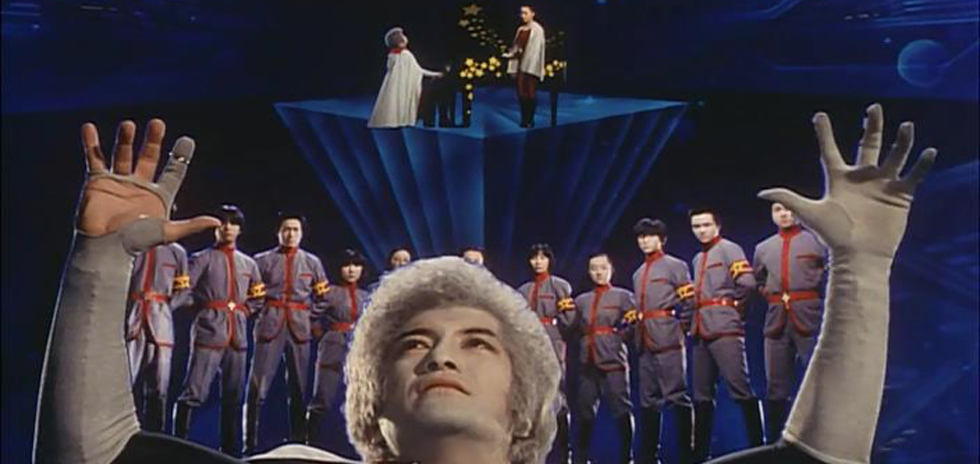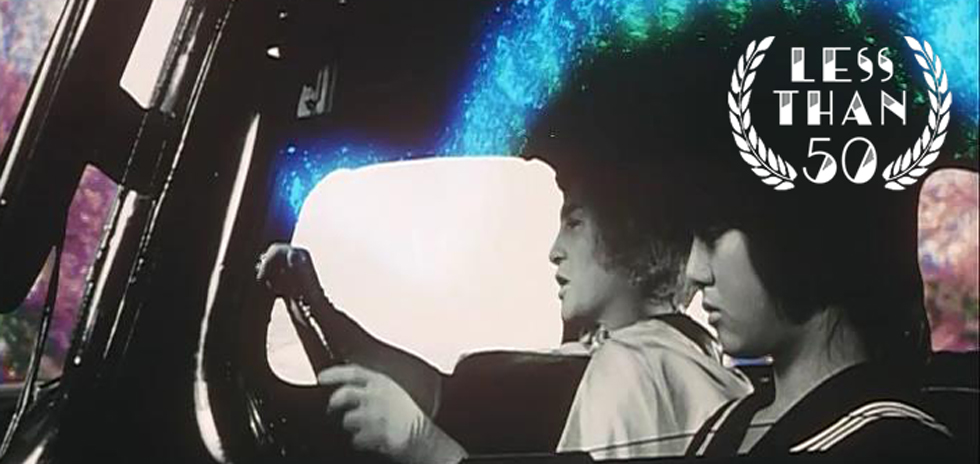In our new column, Less Than (Five) Zero, we take a look at films that have received less than 50 logged watches on Letterboxd, aiming to discover hidden gems in independent and world cinema. This week Conor Bateman looks at School in the Crosshairs, a genre-mashing teen superhero film from the director of cult classic House, Nobuhiko Obayashi.
Date Watched: 27th November, 2014
Letterboxd Views (at the time of viewing): 39
A few years ago Nobuhiko Obayashi’s feature debut House (Hausu) was brought to my attention through a Criterion Collection home video release and the insanely intriguing promotional campaign that went with it. There was a cat on a wall spewing blood, vivid colours everywhere, someone’s head being pulled from a drinking well and it all looked like an unholy mesh of cartoon logic, horror tropes and complete and utter kitsch. The film itself more than delivered on these promises, it’s gleeful delirium that looks oddly stunning despite its jarring mix of animation and live action footage. The fervor over Hausu continues to this day, Criterion’s tie-in t-shirt (with a design taken from Sam Smith’s fantastic theatrical re-release poster) sells a large amount each year, almost now a shorthand for being ‘in the know’ when it comes to both the film and the Criterion Collection itself. The focus on this one film, though, does tend to isolate the rest of Obayashi’s filmography.
On the Hausu DVD set we learn that he started out in advertising – unsurprising considering the experimental techniques he employs in his films – and that Hausu was widely influential on young Japanese filmmakers, who even today cite the film as a major inspiration in their own filmmaking careers. What wasn’t widely spoken of was the fact that Hausu wasn’t a one-time thing, Obayashi not really a cinematic novelty. Stumbling upon his fifth feature in as many years, School in the Crosshairs (ねらわれた学園), you can see that much of what made Hausu oddly timeless was Obayashi’s sense of visual humour and his ability to play off of genre tropes to great effect. In School in the Crosshairs he mixes the teen drama, a Body Snatchers riff and a superhero film. It’s safe to say it’s a fairly unique picture.
The plot, in brief – Yuka (Hiroko Yakushimaru) is a star student at a ‘special school’ (not entirely sure what makes it special other than having a deranged PE teacher) who discovers she has telekinetic abilities when she manages to use her mind to save a toddler from oncoming traffic. As her power develops she confides in her best friend Kohji (Ryôichi Takayanagi), a kendō fiend, whilst trying to combat the influence of a mysterious demigod from Venus (Tôru Minegishi) who wants to recruit her for his scheme to take over the world, already underway thanks to militant schoolgirl Takamizawa (Masami Hasegawa) and her brainwashed discipline patrol.1 The absurdity of it all reflects the same cartoon/manga logic as Hausu, though this time it appears that the film is loosely adapted from a manga, 1973’s Nerawareta Gakuen.

It’s not as consistently insane as Hausu but there are many hilarious visual tricks on show – the matte painting backgrounds first used in Hausu, a recurring gag in which the anger of the PE teacher/kendō instructor causes three ornaments on the principal’s desk to jump up, a sped up car crash sequence and the absolutely bonkers finale (partially captured above), which contains some fantastic early special effects and green screen work. The cinematography is fairly stuck within the teen film genre, with the exceptions being his zany effects, of course, though there are some great ‘of the era’ shots of silhouettes walking in shadow that seem ripped straight from an American 80s picture, whilst also keeping in line with the Body Snatchers plotline influence.
The sound design has its fair share of comedic sound effects but the score is lacking, at least when compared to the hilarity of the hybrid language folk songs in Hausu. Some exceptions to this, though are the opening credits, told mostly in black and white with still images and also a hilarious music montage that acts to cover the entirety of the school’s orientation week, with clubs and societies dancing in time as representative of their ability to attract new members. An odd note, though, the whistle that is played whenever Yuka uses her powers is startlingly similar to the one in The Hunger Games.2
It does have quite an amusing commentary on parent-child relationships, leaning heavily on the idea that parents are wholly ignorant of their children’s activities. Their support for the new militant order has less do to with any real knowledge of the situation than the fact that their kids are less of a nuisance; the parents talk about a secret tuition class with pride, not knowing that it is, in fact, just a brainwashing facility. There’s a great line when Yuka goes to a classmate’s house to find out where the facility is – the classmate’s mother, noticing Yuka’s desperation, says “examination is like war” and then walks away.
In addition to this there’s the Body Snatchers-esque brainwashing subplot, which, as these narratives always do, comes down to the sanctity of individualism and free thought. Whilst never fully engaging with this notion, the result of the finale and the reasoning behind it actually quite cleverly plays off of the idea of noble intentions and avoiding temptation. The horde of brainwashed children, in their military uniforms, appear to us as part of a dictatorial rule, though they could have probably done without the Nazi-esque salute hammering the point home.3
Where Hausu was a riff on haunted house horror films, here Obayashi takes on teen dramas, with a fair share of classroom scenes, school hijinks all positioned around a telekinesis (read: coming-of-age) plot. There is actually subtext in the film about the oversexualisation of Japanese schoolgirls, though I’m not entirely sure Obayashi makes any real point – he has the schoolgirl antagonist punish young boys trying to look up girls’ skirts with her powers, yet also positions the Venusian god as an adult making sexual advances on Yuka, at one point declaring that she is his lover. The final battle, then, represents both a fight for individual perspective but also a rejection of the positioning of children by adults.4
All of this subtext and commentary is incidental, though, in the grand scheme of the film, which manages to pack a lot of competing genre tropes and visual absurdity together and place it front and center. It’s a fun and refreshing watch, showcasing a director with a great sense of the absurd and suggests that we should all look beyond Hausu for some entertaining, clever and impressive filmmaking from Nobuhiko Obayashi.
